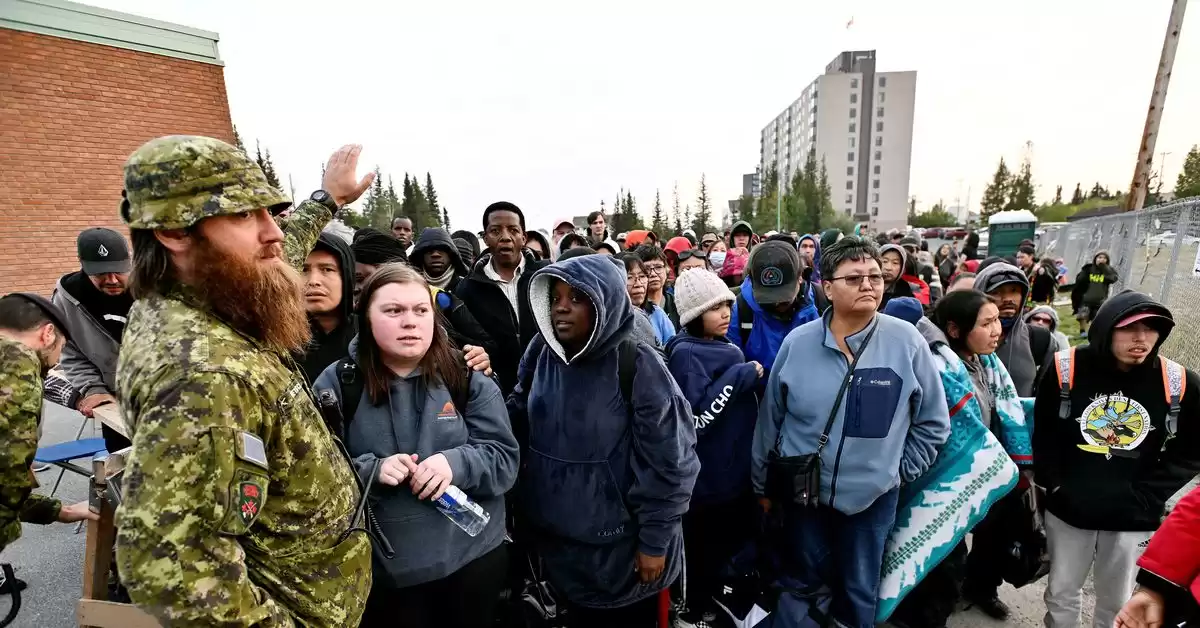'Canada fires: Yellowknife residents flee town, new B.C.'
Residents of Yellowknife, Canada, attempted to flee the town as wildfires prevented their escape, while another fire sparked in British Columbia.
Residents of Yellowknife, a remote town in Northwest Territories, Canada, were attempting to flee on Friday as flames blocked their escape routes, while another wildfire ignited in British Columbia's Kelowna region. A state of emergency was declared in Kelowna and surrounding areas, with officials warning that the next 24 to 48 hours would be extremely challenging. Airspace was closed to accommodate water bombers.
The fire, which had been burning since Tuesday, crossed Okanagan Lake and reached parts of Kelowna, causing mountains surrounding the city to catch fire. West Kelowna Fire Chief Jason Broland stated that they fought hard to protect the community, but the fire created an eerie glow that turned night into day.
Over 2,400 properties were evacuated, and thousands more were put on alert to leave at short notice. Several structures were destroyed overnight in West Kelowna. Broland warned that the wind would be stronger than the previous day, and the situation would worsen.
This year's wildfire season in Canada has been particularly severe, with over 1,000 active fires across the country. Meanwhile, in Yellowknife, the capital of Northwest Territories, a massive fire threatened the city. The regional fire service reported little progress in containing the fire, and strong winds were expected to push it towards the city. The fire was predicted to reach the suburbs by the end of the week.
The fire, located about 15 km northwest of Yellowknife, emitted a strong smell of smoke throughout the city. Fires were burning on both sides of the only open highway leading out of Yellowknife. The fire service warned of critical and challenging days ahead.
As of noon local time, an additional 20,000 people were expected to evacuate the city. Yellowknife Mayor Rebecca Alty emphasized the importance of leaving as soon as possible, but assured residents that the highway would remain open until it was safe. Flights would also continue after the evacuation deadline.
Calgary received 15 evacuation flights on Thursday and anticipated 26 more on Friday, transporting nearly 2,300 people. The Canadian military also facilitated evacuations, with 79 people evacuated on Thursday and more flights planned for Friday. Approximately 65% of the population of Northwest Territories, totaling 46,000 people, were prepared for evacuation.
Fire crews employed various tactics to combat the fire, including cutting vegetation, setting up sprinkler systems, and deliberately starting fires to eliminate fuel. Experts attribute the severity of the wildfire problem to climate change, as drought and high temperatures have contributed to the increased number and intensity of fires. Much of Canada has experienced unusually dry conditions.
In a separate development, Transportation Minister Pablo Rodriguez urged Meta, the parent company of Facebook, to allow news stories to be shared on their platform. This came after complaints that Facebook was blocking critical coverage of the fire. The dispute arose from a law requiring revenue sharing with local media.
As the number of evacuees increased in Grande Prairie and St. Albert, both cities declared that they had reached full capacity and redirected arrivals to a new center in Leduc, south of Edmonton. Among the evacuees were the Goor family from Hay River. They received an alert on their phone while camping, notifying them that their son Liam, who was returning from a cadet trip in Yukon Territory, would need to be relocated.
For Paula Gore, the most important thing was the safety of her family. She emphasized that they had each other and their pets, and that was all that mattered in the moment.











Comments on 'Canada fires: Yellowknife residents flee town, new B.C.'